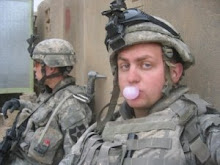Forward thinking propelled the Stryker into 21st century warfare. Its necessity rises from the philosophy that big, conventional tank-on-tank wars were a Cold War relic and unconventional, smaller wars were going to be all the rage. Egghead thinking prevailed if Iraq and Afghanistan are any indication.
The Stryker is an eight-wheeled armored infantry carrier specifically designed for urban conflict. Its thinner armor relative to the Bradley and Abrams Main Battle Tank gives it the mobility and speed needed to meet unconventional threats. Think blitzkrieg meets mujaheddin. Unlike the Brad and Abrams, the Stryker sits on top of eight huge tires, each capable of running completely flat. For defense, each Stryker is fitted with either a .50 cal machine gun or a Mk-19 grenade launcher, fed by linked grenades for automatic fire. The Mobile Gun System variant, in contrast, boasts a 105mm cannon. In combat, the armor can stand .50 cal fire but crumbles under the explosions of RPG fire. To combat this effect, a cage was built around the vehicle. Slat armor is just narrow enough to force the warhead to explode several feet from the Stryker, displacing deadly shrapnel.
Bottom center: Slat armor
The most common variant is the Infantry Carrying Vehicle, the kind I rode in for my entire enlistment. A vehicle commander guides the driver, the squad leader observes from the front, and two men in the back watch the flanks of the vehicle. With retrofitted armor, these positions leave the soldiers vulnerable from the neck up or the chest up, depending on the defilade. Inside, two benches seat three men on one side and four on the other. Situations on the ground dictated how many men could be crammed into a moving vehicle in combat. Seventeen fully armored men and one dog was the unofficial platoon record. Some have asked me what it's like to ride in a Stryker. Here's your answer:
Diehards of OPSEC, I hope you are pleased. I edited out our terp and super duper tech equipment. Credit goes to Dozer for the video. Shauu!
When the Stryker was first in combat in 2003, pundits, analysts and dudes stuck in the 80s were falling over themselves to declare the Stryker a failure. In actuality, it has risen from a strange new vehicle to a must have in combat.
The Stryker is the only vehicle in the American arsenal capable of dropping a fully equipped squad onto an insurgent's doorstep, and it will do it quietly. My brigade earned the nickname Ghostriders in its first deployment for their ability to sneak into neighborhoods in the silence of night, nab potential bad guys and leave unnoticed. As a weapons platform, Strykers have the ability to have three barrels and a crew served weapon pointed at any direction at any given time.
Modern COIN doctrine requires that two Stryker brigades operate in Iraq at any given time. It's a testament to the ferocious tenacity of Stryker soldiers to bring the fight to the enemy at every turn. It's no coincidence that Strykers have led in nearly every major campaign since the invasion. From Tal Alfar and Mosul in 2003-2004, to Baghdad in 2006 and Diyala Province from 2007 to present, Strykers have been in the thick of it. In Baqubah, IEDs became such a nuisance that we only used the vehicles for infiltration and exfil. Still, we were able to subdue most of the city before reinforcements arrived months later. It is clear that it isn't only the Strykers that make a difference, but the soldiers inside of them. No fight was tougher in 2007 than the battle for Baqubah, and it was conducted with a minimal amount of vehicle support. The capital of al-Qaeda in Iraq was toppled by Stryker soldiers, never deterred over the loss of the vehicle itself.
Strykers are the future of the Army, if it isn't already clear. The days of tank-on-tank warfare are over, and no other unit is better prepared to fight a sustained battle than a Stryker brigade. Yet Strykers are hardly recognized for helping to turn the tide in Iraq despite the 3rd Stryker Brigade leading in both Baghdad and Diyala Province, places that were hotly contested by both American and insurgent forces for the past several years. If anything, the early critics of the Stryker can be finally silenced as it becomes the centerpiece of American counterinsurgency operations.
The most important part of a Stryker unit
AH

